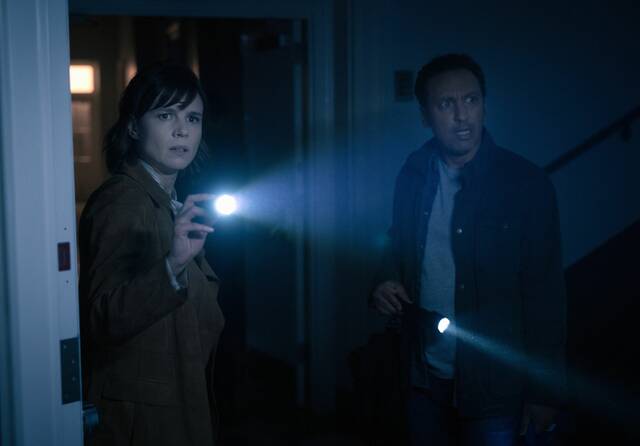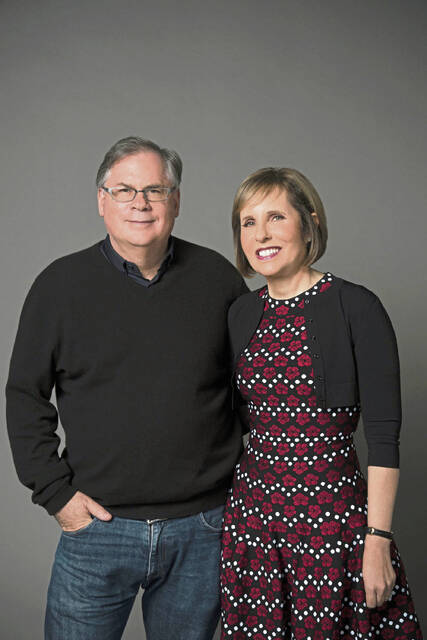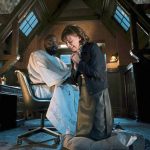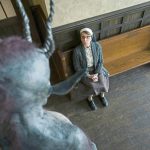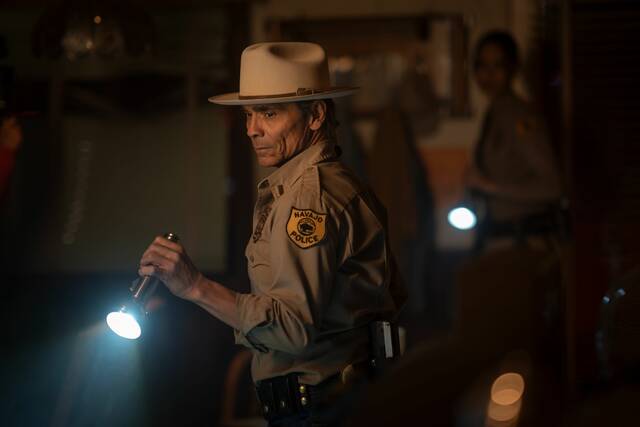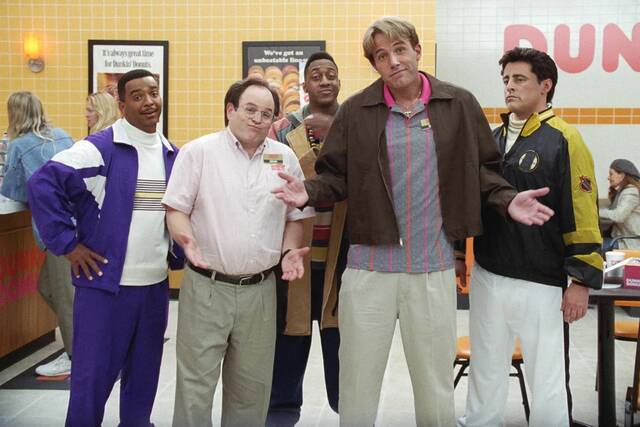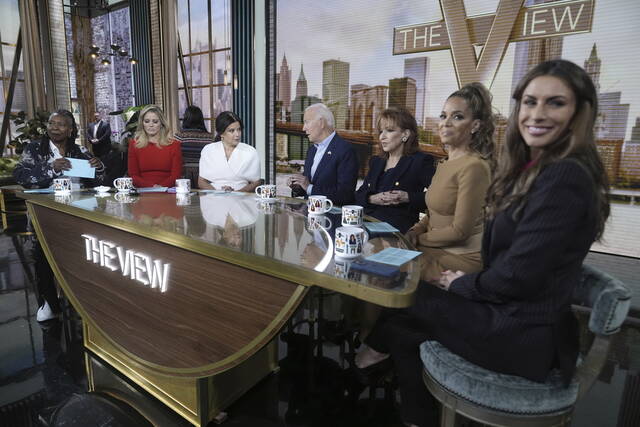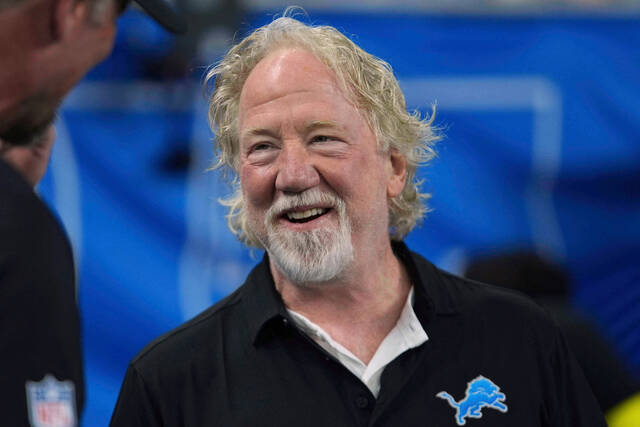Trib Total Media TV writer Rob Owen offers a viewing tip for the coming week.
While husband-and-wife writers Robert and Michelle King’s “The Good Fight” won’t return to Paramount+ until Sept. 8 for its sixth and final season, their supernatural-adjacent “Evil” returns Sunday for its third season — but it’s the first season produced with the knowledge it would be on Paramount+.
“Evil” began as a CBS series in the 2019-20 TV season, and then after season two had been filmed, the show got rerouted from CBS to sister-platform Paramount+.
The new season includes a bit more profanity, but the Kings have not gone full-HBO with the “Evil” content.
The series follows newly ordained Roman Catholic priest David Acosta (Mike Colter) who, with skeptical psychologist Kristen Bouchard (Katja Herbers) and contractor Ben Shakir (Aasif Mandvi), investigates possible miracles, demonic possessions and hauntings on behalf of the church. The trio often find themselves contending with creepy Leland Townsend (Michael Emerson), who has roped Kristen’s mother, Cheryl (Christine Lahti), into his evil schemes.
Here’s what the Kings had to say about season three, which will release one new episode weekly on Sundays beginning June 12:
Q: How far plotted out is “Evil” in advance? And how much are you making it up as you go along?
Robert King: I would say every year we know 50% of what we’re doing. And then we allow ourselves a lot of leeway, not only because whatever world events start infecting it, but also, when you’re finger-painting, you do things intuitively. You leave yourself enough canvas space that is not pre-planned for what you’re doing. But on the other hand, you need structure.
Michelle King: It feels like we know more about what the characters are thinking and feeling and less about what cases they’re being sent out to investigate. That’s more what we’re discovering along the way.
Q: By having the structure of kind of a case-of-the-week, it allows you to dip into character stories and dip out of them. One story I wonder about that you dip in and out of is Ben’s girlfriend, who seemingly switched personalities with her twin last season. Will you revisit that this season?
Robert King: I think we will revisit that again, but not necessarily this year. Sometimes, we resolve things by being a little “Twilight Zone”-weird. That was a mind-buster a little bit. Poor Ben has been going through a lot of things that break his mind. You’re not sure how that happened. Is there really a sister or is this a fictional thing? That is the question for Ben.
Q: I’m curious about the Kristen character, and both how she was initially conceived and how she evolved. In the beginning, she sort of reminded me a little bit of Scully from “The X-Files,” but Scully would never murder someone as Kristen did. So how did you come to that point that that was how you wanted to go with the character? And do you sort of see her as an antihero at this point?
Michelle King: I don’t feel toward her as though she were an antihero, and yet, she behaves in ways that are not at all what you see with a traditional hero, which for me is part of the fun. Can you continue to love the character who murders a serial killer and then gets away with it because of white privilege? That’s pretty far out.
Robert King: We didn’t start there. We thought this was going to be Donna Reed, (the mom in) a traditional, four-children family. But part of it is based on Katja Herbers and how she plays it. There’s such a sweetness to her appearance, and she’s willing to go so dark with her performance or just wild, I kind of think she guided us to (have Kristen) become a killer. She’s the problem, not us. Our hearts are in the right place. It’s Katja’s that’s the problem.
Q: When we came to that murder at the end of season one, do you think that at all played into the decision not to bring “Evil” back on CBS, but to move it over to Paramount+?
Michelle King: I don’t think so. It’s recognition that they had this new streaming service, and the show would benefit from being on it, and the service would benefit from having that show.
Robert King: I also think (CBS) wanted more shelf space for the Dick Wolf kind of shows there. They wanted us out to put a procedural there, I guess.
Q: Was there pushback from CBS about taking Kristen in that direction?
Robert King: Never was, which is odd. I would’ve pushed back, like, “What are you doing?” But we left it slightly ambiguous at the end of the first season. Often we surprised them, ‘Oh, you are going there? OK, you must know what you’re doing.’ ”
Q: I am baffled by what’s going on with Cheryl (Christine Lahti) and Leland (Michael Emerson). I assume I’m supposed to be baffled or maybe I missed something along the way with the blood stuff. Are we going to get more clarity on that? Or did I completely miss something?
Michelle King: You did not miss something. As you move through the season, you will see what they’ve been up to.
Robert King: The blood work we’re thinking is a bit of their fountain of youth or what they believe is their fountain of youth. It’s almost vampiric, like a vampire taking the blood from someone and using it.
Q: And the fertility doctor who was last seen in Leland’s pantry. I wasn’t sure if she was dead or not. I thought she was not dead. Is she still in there?
Robert King: Yes, she is. And that will come back this season.
Q: When you look at season three, what’s the overall theme? And how does Cheryl’s and Leland’s collaboration play into that?
Robert King: To me, the theme is about temptation. Last season was a theme about the evils coming from inside Kristen and inside the house. This season, it’s much more about David and him becoming a priest. We’ve had a lot of talks in the writers’ room about addiction and how addiction starts as so joyful because you’re really feeding that urge. And then, the more you feed that urge, the more it becomes something almost evil within you, that you rely on it more and more. So, I think what we’re talking about is addiction as temptation, temptation as addiction.
Q: And lastly, the doomscrolling. Leland wants Cheryl to keep people doomscrolling, I’m guessing that you’re grabbing from the real world on that. How does that continue to play out?
Michelle King: You just see that Leland’s hope is to make the world miserable, to take all the joy out and take people as far away from God as possible. And to do that isn’t necessarily to make everything bad but just to make everything scary, unsettled, not knowing where the next awkward currents will come from.
Robert King: It has a direct correlation with “The Screwtape Letters” by C.S. Lewis, this idea of you don’t kill their families. Job is not as important as unsettling everybody. And that, I think, is the goal of Leland. Now, is he doing that because he’s a psychopath with money behind him? Or is he doing that because he truly is demonic? At a certain point, the show says it almost makes no difference. If the effect on you is the same, it doesn’t make a difference if it’s supernatural or natural. And obviously, we know with trolling farms, this is a real thing, the troll farms that are guiding people a certain way. It’s all about making people question truth itself.





